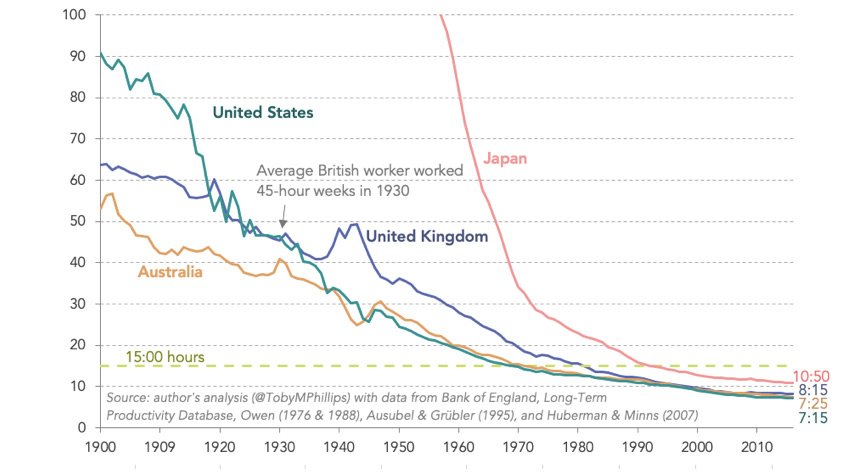How Much Is Enough Book Summary by Robert Skidelsky and Edward Skidelsky raises an inquiry about how much money is enough for an average person to live a good life by working less and still enjoy more. It also talks about how Keynes’s predictions were wrong.
Who should read the “How Much Is Enough Summary”?
- Anyone stuck in a stressful job and wondering how many years a person should work to live a good life after retirement. (This type of mindset has a problem, though)
- Anyone who wants to find out if it’s okay to make money the only goal in life.
- Anyone who wants to work less and have more fun in life.
Check the price of this book on Amazon: Paperback | Hardcover
Robert Skidelsky is an Emeritus Professor of Political Economy at the University of Warwick.
Edward Skidelsky is a lecturer at Exeter University, specializing in aesthetics and moral philosophy.
The core idea in this book
The core idea in this book is:
Find out exactly how much money is enough to live a good life. And how to work less and enjoy more.
So various questions puzzled the authors:
- How much money is enough?
- What is a good life, and how to live it?
- Why are developed countries still working despite having enough money to buy whatever they want?
- What can we do to work less and use our time wisely?
- Is there any end to this endless pursuit of money?
All the chapters in this book are centered around these questions.
“How Much Is Enough” Meaning?
This question simply asks precisely how much money one needs to earn and how much work an average person must do to work less and live a quality life.
How Much Is Enough Book Summary (PDF)
In this book summary, I’ll share the top lessons I learned from this book.
So without further ado, let’s dive right in.
Lesson #1: Money must not be the ultimate goal of life.

There is no doubt about it:
We all need money to eat and survive in this jungle.
The question is:
Should one make MONEY the ultimate goal of life?
The author says that this isn’t helpful.
Allow me to explain.
Money is supposed to help you live a quality life.
So before you join the race of endless pursuit of money, you should ask yourself:
“What does it mean by a quality life?”
Is spending time with your family a quality life?
Is going to the beach during your vacation a quality life?
Is binge-watching TV shows on Netflix a quality life?
If you think about it, you’ll find that how you spend your time and where determines the quality of your life.
So the key to living a quality life is to have enough time to choose between the options and wisely find the right thing to do.
But if you look at an average person, you’ll see that he works more than he needs to do?
Why?
The answer is:
He doesn’t have clear goals.
So for most people, earning more and more money is the only thing to do in life.
And why do they never stop and ask, “How much is enough?”
That’s because they have unlimited desires to fulfill.
So they keep working to raise their standards and match their income to a level so that they can buy the expensive products in the market.
If money must not be the ultimate goal of life, what should it be?
The primary goal of life should be to live a quality life and intrinsically become a more conscious being.
Everything else should be secondary.
Sadly, for most people, earning more money is the primary goal.
As a result, the entire humanity is moving in the wrong direction.
Also, the desire for more money without knowing what to use it for increases society’s ego, hatred, and discrimination.
The solution here is simple:
Realize that money is essential. But don’t make it your only goal in life.
Does this mean you have to earn less money? Absolutely not.
You just have to become more conscious about the quality of your life.
Lesson #2: Keynes falsely predicted that average work hours in developed countries would reduce to 15 hour weeks

The authors talk about Keynes’s predictions.
I won’t be going into all the details.
Keynes was an economist. He predicted that people would work less in the future as they would have enough money to satisfy all their desires.
Did this happen? No.
He failed!
People still work as much as they did when Keynes made his prediction.
So why did he fail?
The biggest reason he failed was that:
He thought of human wants as finite.
But in reality, our wishes are never-ending.
There is no way to stop our minds from wanting things that give us pleasure.
Most of us are pleasure-centered human beings.
That means:
We would go to great extremes to attain pleasure.
Why is our mind like this? Nobody knows.
What we know is that humans have always wanted products to consume.
We have somehow become addicted to creating and consuming products that give us happy sensations.
And since we have no control over our minds, we suffer due to our self-created problems.
It’s a vicious cycle.
We want more. We create more to consume more.
To buy more, we have to work more.
In short: To consume more, we have to work more.
So our own desires have pushed us to work more.
This proves that Keynes’s predictions are wrong.
He thought that people would become wise enough and start working less once their desires were satisfied.
But we all know: We can never stop desiring!
Or can we? Well, that’s another topic for debate.
The authors, during their research, also found that rich people work more than poor people.
To verify this fact:
We can look at the corporate ladders.
The people at the top have way more responsibilities. So even if they don’t do much manual labor, the overall work done by them is more.
So rich people have to work harder than poor ones to sustain their positions on the corporate ladder.
Well, there are always exceptions.
But we are talking in a general sense here.
Lesson #3: Work is also done more when you enjoy it.

Another reason we work more is that some people enjoy their work.
A few wise people choose their work in such a way that it aligns with their personality.
Their work is their identity and a thing of status in society.
So yeah, some people like the work they do.
Consequently, they end up working more than they need to.
And there is no problem with that.
It increases the average work hours per week, though.
And when we talk about averages, they usually don’t give a clear picture.
For instance, if there are ten people. And 9 of them have a meager income. But if the 10th person is Jeff Bezos, you can imagine what the average numbers would show.
Most people trust averages without considering how biased they can be.
Keynes also missed the point that people may like their work. He thought of work as something unwanted.
It’s also true that most people’s work is unwanted, and machines can do the same.
Keynes thought that machines or technological progress would be enough to reduce average work hours per week.
But as you can see around, despite having smart gadgets, an average person keeps working.
The hours per week are still pretty much the same.
Lesson #4: Work less and use your leisure time wisely.

Continuing the previous idea, one should work less.
Why work less?
To save our time.
And for what?
To put it to good use.
“Really… is that it?”
Yeah, it’s that easy.
What is leisure time? It’s the free time.
Do we like free time?
Well, we don’t hate it. But we also don’t like sitting in one place doing anything.
Ever thought why?
That’s because when we work, it gives us a sense of satisfaction.
There is a bias, though.
Often we don’t need to work as much as we do.
But if we don’t do anything, people say that we are lazy.
So most people — to avoid the guilt of not doing anything — try to do some work.
Another argument for working more is that:
Work gives you meaning.
Yeah, but even then, you must be productive.
Even if your job gives meaning to your life, it should be done productively.
Remember that you can always put your leisure time to good use.
If a task doesn’t require any more time, you must not keep doing it for its sake.
Lesson #5: Your addiction To consumption is making you work more.

Today’s world is all about consumption.
We are living in the information age.
Earlier, we consumed only physical goods.
But now, we also consume virtual goods.
On top of that, the things we consume today are contagious.
That means:
They have become an integral part of our lives.
They are hard to avoid.
For instance, we can’t live without our mobiles. So what do we do? We go and buy an expensive one.
We even attach our self-images to the products we own.
The more expensive the product we own, the more self-confidence we feel.
Although it’s stupid, it happens to most people.
We are not addicted to drugs. But we are addicted to our shiny gadgets.
Now, what are the consequences?
It’s fueling our desire.
The authors talk about how various religions don’t support the idea of pursuing wealth as the ultimate goal.
If you read Hindu scriptures, you’ll learn that to become a self-realized person, you must be free from all desires.
You should practice moderation.
There are sayings like “Too much of anything is bad.”
The developing countries are working to become like the developed countries.
It’s still not adequately defined precisely what the ultimate goal is.
What’s surprising is:
The already developed nations are putting even more money into staying on the top of their game.
So, although nations are growing…
The question is:
Is an average person becoming happier?
Are we living a more satisfactory or good life?
Is all that technological progress helping us live a good life?
The answers to all these questions are subjective.
It’s hard to measure them clearly.
You can count the number of coins you have in your wallet. But you can’t measure how happy you are in reality.
So our disability to define spiritual aspects of our life and our ignorance to realize the problems with capitalism leads us towards the endless pursuit of wealth.
Lesson #6: Leisure is an integral part of life.

The authors count leisure as an element of a good life.
You may be wondering what “leisure” has to do with a good life.
Allow me to explain.
Leisure is simply the free time when we are not working or having fun.
Having fun is essential. Yes, it’s as important as doing work.
Life is not supposed to be lived under stress all the time.
But often, people do way too much work and get stressed.
When you have free time, you can do whatever you want.
In fact, the word “work” becomes useless in leisure because you are doing what you like.
Work done during leisure frees you. It releases all your tension.
It gives you time and space to think.
It allows you to reduce the mental clutter.
Leisure is not something you should feel guilty about.
Not every work should be done to earn more money or fulfill a goal.
The authors say that life should not be spent preparing, you should also live your life.
Yes, you can argue that working is also living.
But for most people, work doesn’t provide them any mental satisfaction. They do it purely for money.
Which takes us back to the same question “How much money is enough to live a good life?”
The key idea here is:
Allow yourself to have some leisure time.
It’s one of the key elements of living a good life.
Lesson #7: Technological progress should be limited to save the environment.

Since we don’t know how much is enough, we are trying our best to expand.
But the problem is:
All those technological advancements come at a cost.
The resources on earth are limited.
In short: The environment pays the price.
There are many debates over this.
Environmentalists want to protect the environment by somehow stopping the wastage of the resources on this planet.
But this goes against the ideas of capitalists.
Since all they care about is money or profits, they use the environmental resources without keeping in mind the environment’s safety.
The key here is to find a way to so that we meet the future as well as current requirements.
In other words:
Sustainable growth is the only way.
According to the authors, there must be a limit to how much growth we should pursue.
There must be an end to it once we have satisfied all our wants.
It becomes to realize that we all depend on nature.
And by not putting a limit on how much we deplete the natural resources, we are only hurting ourselves.
Global warming is a worldwide phenomenon.
So it’s not something that only environmentalists should care about.
We are all part of this giant ecosystem.
If individuals learn the critical elements of living a good life and properly define how much wealth they need to live a good life, such problems may be solved.
We are only preparing a worse future for future generations by not addressing these issues.
How Much Is Enough Quotes
Here are some of my favorite quotes from this book:
No bounds to riches have been fixed for man ~Solon
Happiness is not just an inner feeling, but a stance, an outlook on reality.
Science is a marvelous instrument for the exploration of the external nature, but where the subject is the human good, it is our own intuitions, broadened by reading, travel and conversation, that must be our guide.
How Much Is Enough Review
[amazon box=”0241953898″ template=”horizontal”]
I learned new things from this book.
It gave me a different perspective on money.
Most books about money talk only about attaining more of it.
But the authors have researched a lot and questioned the idea of endlessly pursuing money as if it’s the only thing that matters.
However, the book itself didn’t have good paper quality. The fonts are a bit small in the copy I received.
Despite the book being good, I won’t recommend it to beginners who rarely read books.
The reason is:
The authors assume that people know about terms like capitalism, extremism, utilitarianism, etc.
The authors have also taken references from religious books like Bible and other such scriptures. So it doesn’t make sense for a person to read this book if he does not know about them.
But yes, you can do your side-research about all those topics.
I found this book a bit harder to understand than other books.
I don’t know when this book was written, but the problem of Global warming was discussed in it. The idea that technology is coming at the cost of our limited resources piqued my interest.
Although companies tout how they use Green Energy in their projects, I doubt that it isn’t enough.
I think I will do more research on it. So I can’t say anything for sure in that case.
I would give this book a score of 7/10.
Now it’s your turn
I hope you got a lot of value from this summary.
If you liked it consider sharing it with your friends and family members.
Feel free to let me know your thoughts in the comments below.
And if you want to stay in touch with me or book summaries, subscribe to my free weekly newsletter.
Don’t skimp on reading the book!

